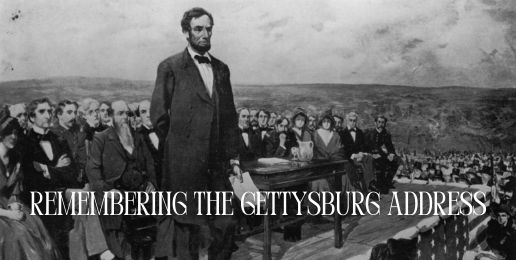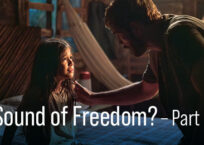
Written by Mark Zumhagen
As you know, Lincoln was our first Republican president and served during the entire course of The Civil War. The war ended on April 9, 1865. Lincoln fell to an assassin’s bullet in Ford’s Theatre 5 days later.
The war, which cost an estimated 750,000 American lives was largely fought over the question of slavery, an institution which initially ended in the confederate south with the passage of the Emancipation Proclamation on January 1, 1863, in the middle of the war.
Slavery was finally ended in the entire United States with the ratification of the 13th Amendment on December 6, 1865, 7 months after the war had ended.
The Gettysburg Address was delivered by Abraham Lincoln on November 19, 1863. It was given at the dedication of a newly established national cemetery near Gettysburg, PA, the small town and countryside where the battle of Gettysburg had been fought 4 months earlier on July 1,2, and 3, 1863.
It was an immense and bloody 3-day battle with a narrowly won Union victory as the outcome. Both General Meade of the North and General Robert E. Lee of the South tendered their resignations to their respective presidents because of the tremendous losses incurred by both armies during the battle. Both resignations were declined. The battle resulted in 50,000 dead, wounded, or missing.
The main speaker of the day was Edward Everett, a renowned orator from Massachusetts who had served at various times as Governor, US Senator, US Representative, and as President of Harvard University. His 2 hour and 8 minute presentation recounted the details of the 3 day battle and was well received by the 15,000 that attended the ceremony.
Lincoln’s dedicatory remarks were anticipated to be briefer, but nobody anticipated the brief 2 and ½ minutes of his address. The photographer poised to take his picture missed the opportunity entirely.
Contrary to popular legend, the speech was not hastily written on the train trip from Washington to Gettysburg. Lincoln crafted the speech over several preceding days and carefully refined and corrected it up to the day of its presentation.
The speech consists of 272 words, the majority of these being of one syllable. It is ten sentences in length. It has become the most iconic speech ever given in the United States and used to be required for memorization in our public schools. It was given in the middle of our nation’s second existential crisis, the Civil War, the first existential crisis being the Revolutionary War which established our nation.
As Lincoln presented his speech, it wasn’t entirely clear that our country could survive the war and reunite as the United States, but Lincoln used the narrowly won victory at Gettysburg as a call to action for the rest of the country to press on to this goal.
His opening “four score and seven years ago” with its biblical overtones takes us back to 1776, the signing of the Declaration of Independence which recognized “that we are endowed by our creator with certain unalienable rights, among these are life, liberty, and the pursuit of happiness.”
This was the touchstone of the American experiment.
It acknowledged rights that were not bestowed by any government, but inherently given to all men by the God who created them. These God-given rights consequently could not be infringed upon by any government. Lincoln recognized this founding principle as the main issue being worked out through the Civil War, and that American slavery was a direct violation of this principle.
As Lincoln gave the address, he added 2 words which he had not included in his written copy. The words were “under God.”
We know from Lincoln’s private and public writings that he came to see the war as a spiritual battle– that God had an argument with the United States over the issue of slavery. He recognized that without repentance and divine intervention, the country would be lost.
I believe we stand at a similar juncture today. Eric Metaxas, Christian author, speaker and champion of our country, has correctly called our present times America’s third existential crisis.
His newest book, Religionless Christianity, is a call to Christians to live out their faith in the public square, even and especially when that faith is at odds with the current cultural dictates of our society. It is required reading for everyone and especially for followers of Jesus Christ.
The Christian church, so present in our original founding, has been marginalized by our increasingly secular society. God has been removed from our schools, from our science, from our medicine, from our politics, from our courtrooms, from our entertainment, from our media, and from our daily conversation.
God often occupies only a solitary hour during Sunday services, if that. We have discovered that whenever God is removed from a sphere of life, the enemy enters in to take his place. There is no neutral ground.
The question which our present existential crisis asks is a very specific one and cuts even deeper than the issues dealt with in our previous crises. It is this:
“Can the founding Principle of our Republic, the God from whom we obtain all our rights as well as the life and breath and blessings that we enjoy every day, be excluded from our lives and society without bringing to a disastrous end this great American experiment?”
I think we all know the answer to that question.
It is becoming more apparent every day as we see all the major institutions associated with Christianity and western civilization under attack. Unlike our previous national crises, this present crisis is almost purely spiritual in nature.
We are called upon to make a decision: Are we with the God who created us in His image, or are we aligning ourselves with the Satanic forces of the enemy?
These forces take what Jesus called the 2 Great Commandments and turn them upside down.
The first commandment, to love the Lord God with all our heart, mind, soul, and strength, is denied, since the secular forces of globalist socialism deny the God of the Bible and vest all authority in the savior State.
The second commandment, to love our neighbor as ourselves, is given over to the totalitarian state, which “loves” by forcibly attempting to equalize the playing field using its chief tools of envy, hate, and fear.
But there is hope.
I take tremendous comfort in God’s sparing Donald Trump’s life, and I know God’s people are stirring. We serve a God of Love who has shown His Great Love to us by coming in person to take on our sufferings and overcome death and the god of this world through the death, burial, and resurrection of Jesus Christ.
The ultimate battle has already been fought… and won.
We occupy until our risen Savior comes to finalize His victory. I am grateful for God’s promise to His ancient people which echoes down the corridors of time to us today:
“If my people, which are called by my name, shall humble themselves (there is no room for pride), and pray, and seek my face, and turn from their wicked ways; then will I hear from heaven, and will forgive their sin, and will heal their land.” 2 Chronicles 7:14
As Lincoln inserted God into his address, let us follow his example and reinsert God into our lives. Read His word and pray and take God into your workplace and your home.
Let us hear Lincoln’s words from 161 years ago as a mission/prophecy spoken to us as we boldly go forth to reclaim our country for God’s glory and the glorious purposes which He intended us to fulfill.
May the Gettysburg Address again inspire the citizens of this great country of the United States of America to rise up and finish the battle which has so bravely been fought by those who have gone before us.






















